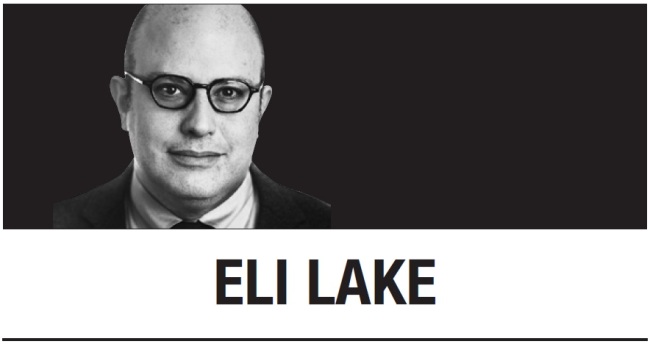[Eli Lake] Trump bank sanctions will hit Iran where it hurts
By BloombergPublished : Nov. 4, 2018 - 17:06
 For the last month, it looked as though President Donald Trump’s campaign of maximum pressure against Iran would include a loophole.
For the last month, it looked as though President Donald Trump’s campaign of maximum pressure against Iran would include a loophole.Sanctions on Iran’s banks, oil exports, ships and ports, lifted in 2015 as part of a nuclear weapons agreement that Trump exited in May, were set to be reimposed on Monday. But it was not clear until Friday whether those banks would be allowed to participate in the Society for Worldwide Interbank Financial Telecommunication, or Swift. That is the system that allows the world’s banks to communicate with one another, making global transactions possible.
Treasury Secretary Steve Mnuchin ended the suspense. “We have advised Swift that it must disconnect any Iranian financial institution that we designate as soon as technologically feasible to avoid sanctions exposure,” he told reporters on a conference call.
Swift is a big deal. Isolating Iran from it compounds its financial crisis. Even if companies were willing to risk being cut off from the US economy to purchase Iranian oil, it will be almost impossible for Iran to receive the payments if its banks are not part of Swift.
So it’s not surprising that Swift was at the center of a policy fight within the Trump administration and the US Congress. On one side were the Treasury Department and the State Department. They worried that a full Swift cutoff would strain relations with allies in Europe who have been trying to keep Iran inside the nuclear deal along with Russia and China.
On the other side was National Security Adviser John Bolton and hawks in Congress who feared that Iranian access to Swift would be a lifeline to evade sanctions and wait until a friendlier US administration took power. European Union foreign policy chief Federica Mogherini has discussed plans for creating a policy vehicle that would shield European concerns from US sanctions. Such a mechanism would rely on Iranian access to Swift.
Mnuchin himself was trying to thread a needle by not making it appear that the US was dictating which banks Swift needed to blacklist, according to administration and congressional sources. That said, Mnuchin also told reporters that the US could impose sanctions on Swift itself.
In the end, the Swift decision represented a compromise. Mnuchin said that some Iranian financial institutions that were not sanctioned could remain on Swift, but only to conduct transactions involving food and medicine.
Nonetheless, the Iran hawks came out on top.
“It would be better if all Iranian financial institutions were disconnected from Swift,” said Richard Goldberg, a former Senate Republican staff member who helped design the Iran sanctions in the early 2000s. “But this is a whole lot better than letting all Iranian banks remain on Swift.”
Goldberg told me that the Treasury will have to watch the humanitarian exemption for Swift closely. In one of the biggest sanctions-evasion schemes in history, a Turkish bank funneled up to $100 billion, by some estimates, into Iran’s coffers in 2013 and 2014, largely under the guise of humanitarian transactions.
Mark Dubowitz, chief executive officer of the Foundation for the Defense of Democracies and a driving force in the Iran sanctions debate for the last decade, told me that he, too, was pleased with the announcement on Swift. He said that it dealt both a material and psychological blow to the Iranian regime because isolation from the world’s financial system makes it more toxic to investors and its own population. But Dubowitz also said that he supported the exemption for humanitarian transactions.
The ball is now in Iran’s court. Since the US pulled out of the nuclear deal in May, its leaders have warned that they will resume the industrial production of nuclear fuel that was largely suspended after the pact’s implementation in 2016. We will find out soon if expulsion from Swift is enough to make the regime follow through on that threat.
Trump for now is pleased. Using a font resembling one used in HBO’s “Game of Thrones,” the president tweeted an image of himself with a play on the show’s slogan, “Winter is coming.”
Indeed. For Iran’s economy, the night is dark and full of terrors.
Eli Lake
Eli Lake is a Bloomberg Opinion columnist covering national security and foreign policy. -- Ed.
(Bloomberg)


















![[Today’s K-pop] BTS pop-up event to come to Seoul](http://res.heraldm.com/phpwas/restmb_idxmake.php?idx=642&simg=/content/image/2024/04/17/20240417050734_0.jpg&u=)